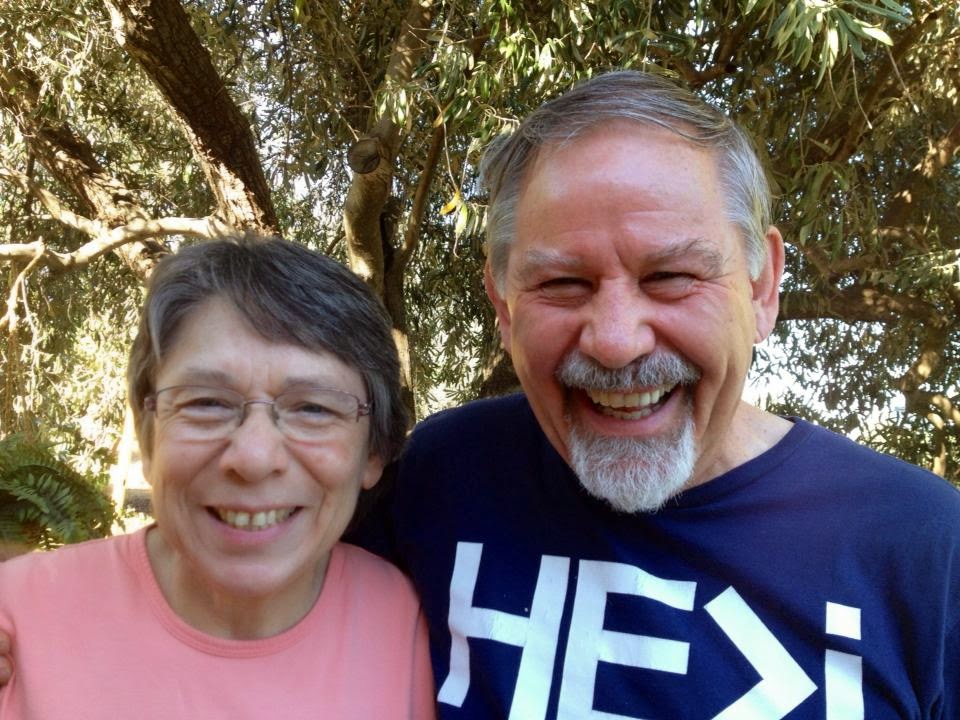 |
| I spent most of my birthday right beside Judy ... on three different airplanes as we returned from the Midwest to Oregon. Here we're leaving Los Angeles en route to Seattle. |
 |
| Photo: Marisa Borg, from Dwaine's Facebook page. |
Maybe a little later we'll have more words to express our sense of loss, but I didn't want this post to go online without at least a few words right away, in honor of Dwaine. Despite our sorrow, I can't help smiling at the image of Dwaine the musician enjoying the "new, new song" of heaven.
"The ecstasy of worship is connected to pure intention." I found these words, without commentary, in one of my odd lists of possible future blog post themes. The trouble is, I can't remember where I got them from. They sound vaguely like Kierkegaard, but Google gave me no clue. But today I came across two items on the Internet that drew me back to those words.
Ben is careful to specify that he's talking about his own tradition of unprogrammed worship, conducted in silence except for unscripted vocal ministry that can be offered by anyone present. Given my own caution about hints of Quaker superiority over liturgical tradition, I was glad that he says, "We do have a liturgy: it's a silent liturgy." That's exactly what my Quaker "godmother," Deborah Haight of Canadian Yearly Meeting, taught me. It's something she learned from the years she lived in Ottawa before the advent of the Quaker meeting she helped start. During those years she attended an Anglican church.
Ben reports the reluctance of many Friends in his yearly meeting to say anything too definite or certain about faith or God. For example, he says,
One of the differences, say, between Quaker meeting and other Christian services is that we're really not sure. We're not sure what we're going to experience in meeting, and we're also, in some curious way, not particularly sure about what it is we're finding in our experience. I think this should be tremendously popular in today's society. There are a lot of people out there who are spiritually hungry, who may be slightly cautious about organized religion, and what we Quakers are offering is a space to explore our spirituality.Ben has visited Friends all over the world and is completely aware that the majority of Friends worldwide are not offering a space to explore our own various spiritualities but a space to gather around Jesus as the head of the meeting and learn from him. But he's accurately expressing the way many British Friends are positioning Quakers in the religious marketplace--a marketplace that is shaped by secular trends of caution and skepticism.
I found it fascinating to contrast Ben's presentation with a blog post by Rachel Held Evans, "On Going Episcopal," describing some of the ways evangelical Christians have reacted to her adopting an Episcopal church as her spiritual home for the present. I was struck by the breathtaking arrogance of some who have reacted negatively to her decision, and their glib assumptions about what she's given up. (She only quotes a small sample, but I've seen a lot more of the same on various Christian news sites and blogs that have commented on her move. I don't feel any obligation to link to them here.)
As a Quaker, I cherish our low-overhead approach to worship and church life, as I experience it in Ottawa Friends Meeting and Reedwood Friends Church, and in just about every other corner of the Quaker world that has been my extended family ever since I became a Christian. Whatever my role in a particular meeting for worship, or in the church structure, and whatever I'm going through in my own life, when worship begins, I'm in a very special zone of reality, for which the word "ecstasy" is not too strong a word. I would like to think that this experience is linked to my faith that I'm there, with my co-worshippers, to meet with God. Nothing more, nothing less.
It is this pure intention that is the center of Quaker simplicity in worship, but isn't it also at the center of every other worship tradition that has integrity? I may worry that too many rites and procedures might weaken this pure intention, or that a corrosive skepticism may discourage those who are actually hungry for this meeting with God, but it is not for me to say that your tradition (liturgical or militantly unprogrammed) does not allow you to express that same intention that fuels my life.
Pure intention, part two.
Will you be in Chicago on March 31? Hear John Lewis and his colleague Andrew Aydin present a program on the second volume of John Lewis's graphic biography, March: Book 2.
Becky Ankeny on the lessons--or the imperatives--Jesus has for us when he cites the story of Jonah and Ninevah.
Unusual for me, an instrumental:
Will you be in Chicago on March 31? Hear John Lewis and his colleague Andrew Aydin present a program on the second volume of John Lewis's graphic biography, March: Book 2.
Becky Ankeny on the lessons--or the imperatives--Jesus has for us when he cites the story of Jonah and Ninevah.
Unusual for me, an instrumental:
1 comment:
Thank you, Johan, first of all for the brief tribute to Dwaine. We are grieving here in the Thomas family.
And thank you for your reflections on the connection between "pure intention" and worship. That's profound and will stay with me.
Post a Comment